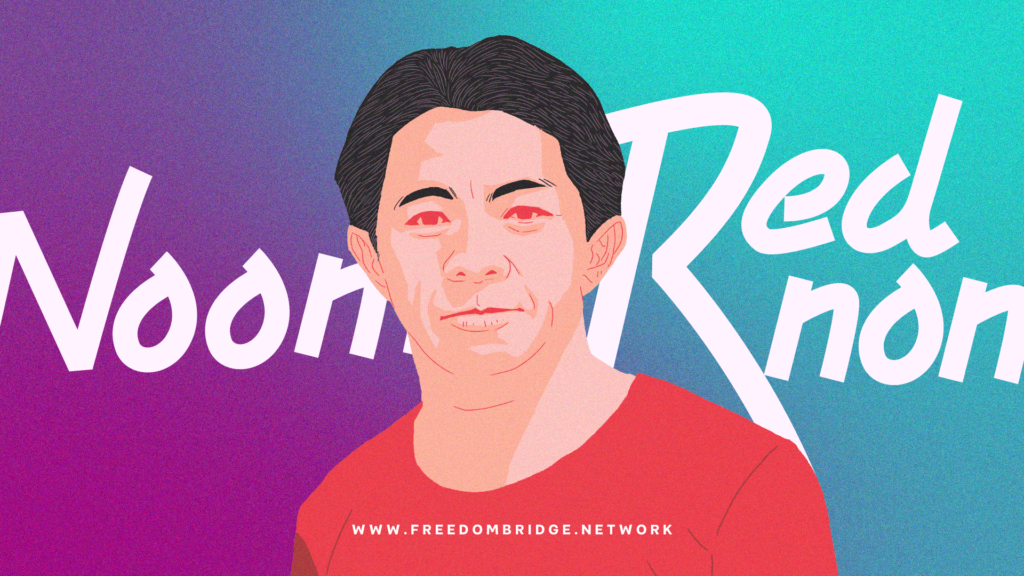This is the story behind the prison walls as a “political prisoner” of ‘Thantawut‘, aka “Noom Rednon”, a suspect in an Article 112 case before politics reached full-blown polarization. He was separated from his son, but moral support from people who shared the same ideology helped to keep him remain confident and wait for the day he could be reunited with his son.
The name “Noom Rednon” might not ring that familiar for current political observers. But if you ask any “Red Shirts” who fought with him after the 2006 military coup, many still remember him as the webmaster of ‘Rednon.com”, which featured content about the Red Shirts’ demonstrations. His name was one among those accused of being part of the “diagram of monarchy abolitionists” (Phang Lom Chao) touted by the Centre for the Resolution of Emergency Situation (CRES). And he was later accused of violating Article 112 before politics reached full-blown polarization.
Noom Rednon’s fight for his ideology came at the expense of being separated from his only son for over three years. Throughout the entire time he was behind the prison walls, not a single day passed without him missing his son. Support and solidarity from the outside helped to keep him strong, resilient, and ready to stand up and fight until the day he could be reunited with his son.
And here is Noom Rednon’s story from behind the prison walls as a “political prisoner” and how he asserts that such solidarity from people around him helped to empower a political prisoner like him. Such moral support will remain meaningful and never be forgotten by him.
An ordinary and not-so-brave father
“I was not at all a brave person. A single father, I raised my child at home and was terrified that my son might be exposed to danger outside. But I was quite politically active. Thaksin was my idol. When Thaksin’s power was seized, it prompted the Red Shirts to fight. I thought I could lend them a hand. Facebook did not exist then. As a website creator, I thought it would not be that difficult to make one. Then, I participated in a mass rally and felt the vibe there. It dawned on me that I could give them some help. I decided to launch a website called Rednon.com which featured news about the Red Shirts’ activities in Nonthaburi,” recalled Noom Rednon, aka Thantawut.
By launching the website, Thantawut was accused being the owner and administrator of the website which was alleged to post messages deemed offensive and threatening to the monarchy. The police raided and arrested him at his home. He and his son were brought to the Technology Crime Suppression Division (TSCD) and he was not informed of his rights.
“There was neither Thai Lawyers for Human Rights (TLHR) nor any other lawyers to give me help then. I was not informed of my rights as a suspect. The police capitalized on my lack of information and knowledge about law and forced me to sign a plethora of documents while holding my son as ransom. I was normally not that dumb, but at that moment, it could hardly eat and my heart pounded heavily. I felt short of breath and my hands and my voice shook severely. Still, even after I was placed under arrest, I was proud of myself for what I had done for a social movement. Then, I started to reckon that my son was still young and he had to sleep with me at the TSCD. I felt guilty about that. Was I guilty for being so brave and causing my little son to get exposed to such trouble?
“On the following morning, as I was still asleep with no pillow, with nothing, and my son was sleeping on my arm, suddenly a police officer barged in shouting so loud causing my son to cry in shock. Then, they brought me to the court. Before that, they told me to contact my relatives to pick up my son. I told them it was not possible as I had no relatives. They told me that if I could not get my relatives to come, they would have to send my son to a children’s home. My son was like my heart. I immediately contacted some Red Shirt colleagues in Nonthaburi. The last image I remember was my son saying goodbye and hugging me. Then I had to board a car with my hands cuffed. We only met again after over three years since I was never once granted bail.
A convicted prisoner in Section 112 and the violence he faced
Thantawut was convicted on an offence against Article 112 and the Computer Crime Act and was sentenced to 13 years altogether. During the trial, Thantawut had problems with his legal counsel which made him feel very uncomfortable. Then, he was introduced to Arnon Nampa who later represented him in court. They have offered help to each other since then.
“It was difficult when I first entered into the prison. I had to sit and sew shoes and had to reach the quota every day. Then, I was sent to Zone 8, a section for repeat offenders and offenders with convictions of serious crimes. The zone was separated from other zones by high fences. Upon my arrival there, I became a target of physical attack. It’s ok. I got used to it. I transformed myself to help other people. Then, hundreds of people were sent to prison for offences against the Emergency Decree. It was me who helped to monitor anyone who might be the next target of abuse. Luckily, Arnon came to visit the prison during the time. If there were any issues to raise, we would ask him to help spread the news outside. It helped to ensure that there was a constant flow of news from inside and that helped to protect us quite well.”
Thantawut insists that the scariest part of entering into prison is not being convicted, but being subject to the physical abuse and violence that permeates the air inside. It was chilling for an ordinary person like him who had never picked a fight with anyone before. Landing in jail because of Article 112 made him the target of several people inside the prison. And eventually, he became a victim of such physical abuse. Meanwhile, psychologically, he was severely tormented by his thoughts about his son while he was languishing in jail as a political prisoner.
“What made me feel lonely and pained me deeply was my son and the fact that I was not able to cuddle him, to hug him, to play with him, and to be with him. Whom was he playing with? When Arnon handed me a letter from him, I cried a river of tears. Whenever I missed my son, I would read his letter. Only when he came to visit me would my feelings be assuaged. Getting to see my son helped to ease my loneliness.”
Food, stuff, letters and moral support
For Thantawut, the letters from outside were a major source of support for political prisoners inside the prison. They served as a vehicle for exchanging of feelings between people who are separated by the walls.
“A constraint for people inside prison is that we cannot communicate with the people outside. We only have two ways to communicate, either through seeing the relatives who come to visit us or through letters. I don’t mean the kind of letters with the same template written to hundreds of prisoners, i.e., I wish you are happy, etc. In most of the letters I have received, the authors praised someone as their idol. Then, they sent such letters with to me without even mentioning my name. Such letters were meaningless to me. At present, when there is a campaign to write to political prisoners, I try to write letters to the people I do not know as well, although I make a slight change of their names to make it sound not so routine. Otherwise, the letters might not evoke much feeling for them. I added some specific information about what they have done before to make them know that I was writing specifically to them.”
Apart from letters which can convey our thoughts and moral support for political prisoners, receiving food and necessary items can help to enhance quality of life for political prisoners. According to Thantawut, after he had spent some time in prison, his father started to visit him and always brought him something. This thrilled him. He did observe, however, how several fellow political prisoners experienced no such thrill like him.
“After my relatives visited, I would get things to eat. It made me feel happy receiving things from my relatives. Then I heard someone say, “Brother Noom, please give me two packs of Mama (instant noodles)”. They were the Red Shirt protestors who were jailed for violating the Emergency Decree. Some did not even have their shoes on, as they were mass-arrested during the scuffle. They came in without anything and I offered them help. I told Arnon the stories. I had no idea what Arnon did outside, but it became a project called “The Red Presents” made possible by fundraising among the people. Well, for people in the prison, not everyone can afford to eat Mama. There are people who are so poor and penniless. I talked with Arnon that at least if we could raise, say, a couple of hundred bath a month, we could buy a carton of Mama so that they can eat this with rice. The rice here is free anyway. Somehow, Arnon managed to raise even more funds to buy milk for us. So for people who have no one to visit them, they each received two boxes of milk with some fruit.”
“Another kind of support is among inmates who are in the same zone. Since we are all political prisoner, we organized together. We supported each other and ate together. It helped to keep our common beliefs. We could share our experiences and help each other. That made us feel better every day. Of course, we disagreed with each other. As human beings, we do fight. But there was no fracturing among us. That is very important support for people who stay in jail.”
After serving time for three years, three months, and fifteen days, Thantawut received a royal pardon in 2013. Less than a year after he was discharged from prison to spend time with his son, a military coup took place in 2014 and he was summoned by the coup makers without any explanation. That prompted him to decide to flee and live in exile.

